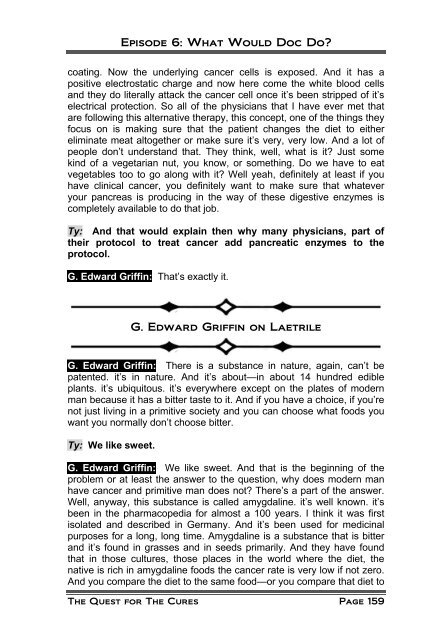Create successful ePaper yourself
Turn your PDF publications into a flip-book with our unique Google optimized e-Paper software.
Episode 6: What Would Doc Do<br />
coating. Now <strong>the</strong> underlying <strong>cancer</strong> cells is exposed. And it has a<br />
positive electrostatic charge and now here come <strong>the</strong> white blood cells<br />
and <strong>the</strong>y do literally attack <strong>the</strong> <strong>cancer</strong> cell once it’s been stripped of it’s<br />
electrical protection. So all of <strong>the</strong> physicians that I have ever met that<br />
are following this alternative <strong>the</strong>rapy, this concept, one of <strong>the</strong> things <strong>the</strong>y<br />
focus on is making sure that <strong>the</strong> patient changes <strong>the</strong> diet to ei<strong>the</strong>r<br />
eliminate meat altoge<strong>the</strong>r or make sure it’s very, very low. And a lot of<br />
people don’t understand that. They think, well, what is it Just some<br />
kind of a vegetarian nut, you know, or something. Do we have to eat<br />
vegetables too to go along with it Well yeah, definitely at least if you<br />
have clinical <strong>cancer</strong>, you definitely want to make sure that whatever<br />
your pancreas is producing in <strong>the</strong> way of <strong>the</strong>se digestive enzymes is<br />
completely available to do that job.<br />
Ty: And that would explain <strong>the</strong>n why many physicians, part of<br />
<strong>the</strong>ir protocol to treat <strong>cancer</strong> add pancreatic enzymes to <strong>the</strong><br />
protocol.<br />
G. Edward Griffin: That’s exactly it.<br />
G. Edward Griffin on Laetrile<br />
G. Edward Griffin: There is a substance in nature, again, can’t be<br />
patented. it’s in nature. And it’s <strong>about</strong>—in <strong>about</strong> 14 hundred edible<br />
plants. it’s ubiquitous. it’s everywhere except on <strong>the</strong> plates of modern<br />
man because it has a bitter taste to it. And if you have a choice, if you’re<br />
not just living in a primitive society and you can choose what foods you<br />
want you normally don’t choose bitter.<br />
Ty: We like sweet.<br />
G. Edward Griffin: We like sweet. And that is <strong>the</strong> beginning of <strong>the</strong><br />
problem or at least <strong>the</strong> answer to <strong>the</strong> question, why does modern man<br />
have <strong>cancer</strong> and primitive man does not There’s a part of <strong>the</strong> answer.<br />
Well, anyway, this substance is called amygdaline. it’s well known. it’s<br />
been in <strong>the</strong> pharmacopedia for almost a 100 years. I think it was first<br />
isolated and described in Germany. And it’s been used for medicinal<br />
purposes for a long, long time. Amygdaline is a substance that is bitter<br />
and it’s found in grasses and in seeds primarily. And <strong>the</strong>y have found<br />
that in those cultures, those places in <strong>the</strong> world where <strong>the</strong> diet, <strong>the</strong><br />
native is rich in amygdaline foods <strong>the</strong> <strong>cancer</strong> rate is very low if not zero.<br />
And you compare <strong>the</strong> diet to <strong>the</strong> same food—or you compare that diet to<br />
The Quest for The Cures Page 159


